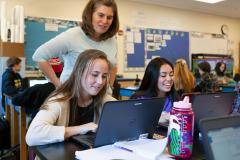K-16 Resources
| Type | Title |
|---|---|
|
Curriculum IPDC Visualization+Data Course This Visualization+Data Course is backward-designed from college coursework. Learn more about the project and additional data courses offered. |
|
|
Curriculum IPDC Math+Data Modules |
|
|
Curriculum IPDC Civics+Data Course This Civics + Data module introduces data literacy through student developed Civics projects. Learn more about the project and additional data courses offered. |
|
|
Curriculum Artificial Intelligence Methods in Data Science Curriculum These open source AI modules were developed through the NSF funded Science+C project. |
|
|
Scientific Publication What Do You Meme? Students Communicating their Experiences, Intuitions, and Biases Surrounding Data Through Memes Memes have become ubiquitous artifacts of contemporary digital culture that integrate visual and textual components in order to communicate about a topic. |
|
|
Scientific Publication ”I happen to be one of 47.8%”: Social-Emotional and Data Reasoning in Middle School Students’ Comics about Friendship Effective data literacy instruction requires that learners move beyond understanding statistics to being able to humanize data through a contextual understanding of argumentation and reasoning in the real-world. |
|
|
Curriculum WeatherX Curriculum The WeatherX project has developed two curriculum units for middle-school science classrooms. |
|
|
Scientific Publication Building toward Critical Data Literacy with Investigations of Income Inequality To promote understanding of and interest in working with data among diverse student populations, we developed and studied a high school mathematics curriculum module that examines income inequality in the United States. |
|
|
Scientific Publication The Potential of Data Collection and Analysis Activities for Preschoolers: A Formative Study with Teachers To support preschool children’s learning about data in an applied way that allows children to leverage their existing mathematical knowledge (i.e. counting, sorting, classifying, comparing) and apply it to answering authentic, developmentally appropriate research questions with data. |
|
|
Interface/Tool Preschool Data Toolbox The Preschool Data Toolbox is a teacher-facing app plus digital teacher guide (available in the Apple and |
|
|
Curriculum Streams of Data: Lesson Plans and Resources Streams of Data has created fourth-grade lesson plans for a five-day sequence about rivers and flooding. The goal of these lessons is to support development of analytical thinking skills around authentic science data. These goals include: |
|
|
Scientific Publication Data Investigations to Further Social Justice Inside and Outside of STEM This article focuses on discussion and preliminary findings from classroom testing of the prototype learning module: Investigating Income Inequality in the U.S. In this module, students examine patterns of income inequality using person-level microdata from the American Community Survey |
|
|
Curriculum Zoom In! Science Zoom In! is a free, Web-based platform that helps high school students build their data literacy through “deep dives” into real-world biology and Earth science problems using authentic data sets. Each Zoom In blended learning module is a multi-day, standards-aligned science inq |
|
|
Scientific Publication Measuring Data Skills in Undergraduate Student Work: Development of a Scoring Rubric Data literacy, or students’ abilities to understand, interpret, and think critically about data, is an increasing need in K–16 science education. |

